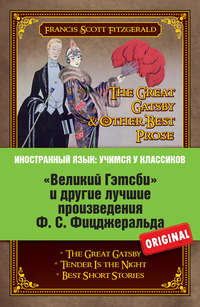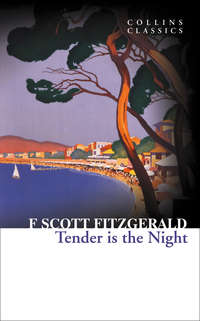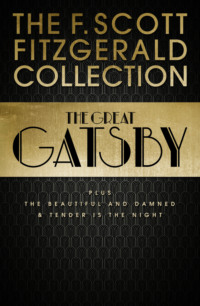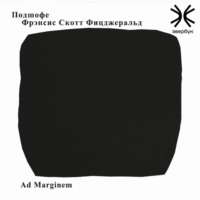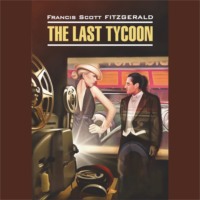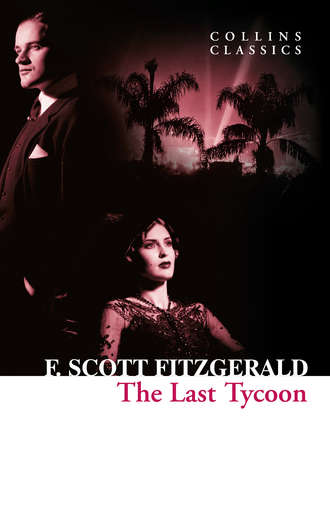
Полная версия
The Last Tycoon
We drove for a long time over a bright level countryside, just a road and a tree and a shack and a tree, and then suddenly along a winding twist of woodland. I could feel even in the darkness that the trees of the woodland were green—that it was all different from the dusty olive-tint of California. Somewhere we passed a Negro driving three cows ahead of him, and they mooed as he scattered them to the side of the road. They were real cows, with warm, fresh, silky flanks, and the Negro grew gradually real out of the darkness with his big brown eyes staring at us close to the car, as Wylie gave him a quarter. He said “Thank you—thank you,” and stood there, and the cows mooed again into the night as we drove off.
I thought of the first sheep I ever remember seeing—hundreds of them, and how our car drove suddenly into them on the back lot of the old Laemmle studio. They were unhappy about being in pictures, but the men in the car with us kept saying:
“Swell!”
“Is that what you wanted, Dick?”
“Isn’t that swell?” And the man named Dick kept standing up in the car as if he were Cortez or Balboa, looking over that gray fleecy undulation. If I ever knew what picture they were in, I have long forgotten.
We had driven an hour. We crossed a brook over an old rattly iron bridge laid with planks. Now there were roosters crowing and blue-green shadows stirring every time we passed a farmhouse.
“I told you it’d be morning soon,” said Wylie. “I was born near here—the son of impoverished southern paupers. The family mansion is now used as an outhouse. We had four servants—my father, my mother and my two sisters. I refused to join the guild, and so I went to Memphis to start my career, which has now reached a dead end.” He put his arm around me: “Cecilia, will you marry me, so I can share the Brady fortune?”
He was disarming enough, so I let my head lie on his shoulder. “What do you do, Celia. Go to school?”
“I go to Bennington. I’m a junior.”
“Oh, I beg your pardon. I should have known, but I never had the advantage of college training. But a junior—why I read in Esquire that juniors have nothing to learn, Cecilia.”
“Why do people think that college girls—”
“Don’t apologize—knowledge is power.”
“You’d know from the way you talk that we were on our way to Hollywood,” I said. “It’s always years and years behind the times.”
He pretended to be shocked.
“You mean girls in the East have no private lives?”
“That’s the point. They have got private lives. You’re bothering me, let go.”
“I can’t. It might wake Schwartz, and I think this is the first sleep he’s had for weeks. Listen, Cecilia: I once had an affair with the wife of a producer. A very short affair. When it was over she said to me in no uncertain terms, she said: ‘Don’t you ever tell about this or I’ll have you thrown out of Hollywood. My husband’s a much more important man than you!’”
I liked him again now, and presently the taxi turned down a long lane fragrant with honeysuckle and narcissus, and stopped beside the great grey hulk of the Andrew Jackson house. The driver turned around to tell us something about it, but Wylie shushed him, pointing at Schwartz, and we tiptoed out of the car.
“You can’t get into the Mansion now,” the taxi man told us politely.
Wylie and I went and sat against the wide pillars of the steps.
“What about Mr. Schwartz?” I asked. “Who is he?”
“To hell with Schwartz. He was the head of some combine once—First National? Paramount? United Artists? Now he’s down and out. But he’ll be back. You can’t flunk out of pictures unless you’re a dope or a drunk.”
“You don’t like Hollywood,” I suggested.
“Yes I do. Sure I do. Say! This isn’t anything to talk about on the steps of Andrew Jackson’s house—at dawn.”
“I like Hollywood,” I persisted.
“It’s all right. It’s a mining town in lotus land. Who said that? I did. It’s a good place for toughies, but I went there from Savannah, Georgia. I went to a garden party the first day. My host shook hands and left me. It was all there—that swimming pool, green moss at two dollars an inch, beautiful felines having drinks and fun—
“—And nobody spoke to me. Not a soul. I spoke to half a dozen people but they didn’t answer. That continued for an hour, two hours—then I got up from where I was sitting and ran out at a dog trot like a crazy man. I didn’t feel I had any rightful identity until I got back to the hotel and the clerk handed me a letter addressed to me in my name.”
Naturally I hadn’t ever had such an experience, but looking back on parties I’d been to, I realized that such things could happen. We don’t go for strangers in Hollywood unless they wear a sign saying that their axe has been thoroughly ground elsewhere, and that in any case it’s not going to fall on our necks—in other words, unless they’re a celebrity. And they’d better look out even then.
“You should have risen above it,” I said smugly. “It’s not a slam at you when people are rude—it’s a slam at the people they’ve met before.”
“Such a pretty girl—to say such wise things.”
There was an eager to-do in the eastern sky, and Wylie could see me plain—thin with good features and lots of style, and the kicking fetus of a mind. I wonder what I looked like in that dawn, five years ago. A little rumpled and pale, I suppose, but at that age, when one has the young illusion that most adventures are good, I needed only a bath and a change to go on for hours.
Wylie stared at me with really flattering appreciation—and then suddenly we were not alone. Mr. Schwartz wandered apologetically into the pretty scene.
“I fell upon a large metal handle,” he said, touching the corner of his eye.
Wylie jumped up.
“Just in time, Mr. Schwartz,” he said. “The tour is just starting. Home of Old Hickory—America’s tenth president. The victor of New Orleans, opponent of the National Bank, and inventor of the Spoils System.”
Schwartz looked toward me as toward a jury.
“There’s a writer for you,” he said. “Knows everything and at the same time he knows nothing.”
“What’s that?” said Wylie, indignant.
It was my first inkling that he was a writer. And while I like writers—because if you ask a writer anything, you usually get an answer—still it belittled him in my eyes. Writers aren’t people exactly. Or, if they’re any good, they’re a whole lot of people trying so hard to be one person. It’s like actors, who try so pathetically not to look in mirrors. Who lean backward trying—only to see their faces in the reflecting chandeliers.
“Ain’t writers like that, Celia?” demanded Schwartz. “I have no words for them. I only know it’s true.”
Wylie looked at him with slowly gathering indignation. “I’ve heard that before,” he said. “Look, Manny, I’m a more practical man than you any day! I’ve sat in an office and listened to some mystic stalk up and down for hours spouting tripe that’d land him on a nut-farm anywhere outside of California—and then at the end tell me how practical he was, and I was a dreamer—and would I kindly go away and make sense out of what he’d said.”
Mr. Schwartz’s face fell into its more disintegrated alignments. One eye looked upward through the tall elms. He raised his hand and bit without interest at the cuticle on his second finger. There was a bird flying about the chimney of the house, and his glance followed it. It perched on the chimney pot like a raven, and Mr. Schwartz’s eyes remained fixed upon it as he said: “We can’t get in, and it’s time for you two to go back to the plane.”
It was still not quite dawn. The Hermitage looked like a nice big white box, but a little lonely and vacated still after a hundred years. We walked back to the car. Only after we had gotten in, and Mr. Schwartz had surprisingly shut the taxi door on us, did we realize he didn’t intend to come along.
“I’m not going to the Coast—I decided that when I woke up. So I’ll stay here, and afterwards the driver could come back for me.”
“Going back East?” said Wylie with surprise. “Just because—”
“I have decided,” said Schwartz, faintly smiling. “Once I used to be a regular man of decision—you’d be surprised.” He felt in his pocket, as the taxi driver warmed up the engine. “Will you give this note to Mr. Smith?”
“Shall I come in two hours?” the driver asked Schwartz.
“Yes … sure. I shall be glad to entertain myself looking around.”
I kept thinking of him all the way back to the airport—trying to fit him into that early hour and into that landscape. He had come a long way from some ghetto to present himself at that raw shrine. Manny Schwartz and Andrew Jackson—it was hard to say them in the same sentence. It was doubtful if he knew who Andrew Jackson was as he wandered around, but perhaps he figured that if people had preserved his house Andrew Jackson must have been someone who was large and merciful, able to understand. At both ends of life man needed nourishment: a breast—a shrine. Something to lay himself beside when no one wanted him further, and shoot a bullet into his head.
Of course we did not know this for twenty hours. When we got to the airport we told the purser that Mr. Schwartz was not continuing, and then forgot about him. The storm had wandered away into Eastern Tennessee and broken against the mountains, and we were taking off in less than an hour. Sleepy-eyed travellers appeared from the hotel, and I dozed a few minutes on one of those Iron Maidens they use for couches. Slowly the idea of a perilous journey was recreated out of the debris of our failure: a new stewardess, tall, handsome, flashing dark, exactly like the other except she wore seersucker instead of Frenchy red-and-blue, went briskly past us with a suitcase. Wylie sat beside me as we waited.
“Did you give the note to Mr. Smith?” I asked, half asleep.
“Yeah.”
“Who is Mr. Smith? I suspect he spoiled Mr. Schwartz’s trip.”
“It was Schwartz’s fault.”
“I’m prejudiced against steam-rollers,” I said. “My father tries to be a steam-roller around the house, and I tell him to save it for the studio.”
I wondered if I was being fair; words are the palest counters at that time in the morning. “Still, he steam-rollered me into Bennington and I’ve always been grateful for that.”
“There would be quite a crash,” Wylie said, “if steamroller Brady met steam-roller Smith.”
“Is Mr. Smith a competitor of Father’s?”
“Not exactly. I should say no. But if he was a competitor, I know where my money would be.”
“On Father?”
“I’m afraid not.”
It was too early in the morning for family patriotism. The pilot was at the desk with the purser and he shook his head as they regarded a prospective passenger who had put two nickels in the electric phonograph and lay alcoholically on a bench fighting off sleep. The first song he had chosen, Lost, thundered through the room, followed, after a slight interval, by his other choice, Gone, which was equally dogmatic and final. The pilot shook his head emphatically and walked over to the passenger.
“Afraid we’re not going to be able to carry you this time, old man.”
“Wha’?”
The drunk sat up, awful-looking, yet discernibly attractive, and I was sorry for him in spite of his passionately ill-chosen music.
“Go back to the hotel and get some sleep. There’ll be another plane tonight.”
“Only going up in ee air.”
“Not this time, old man.”
In his disappointment the drunk fell off the bench—and above the phonograph, a loudspeaker summoned us respectable people outside. In the corridor of the plane I ran into Monroe Stahr and fell all over him, or wanted to. There was a man any girl would go for, with or without encouragement. I was emphatically without it, but he liked me and sat down opposite till the plane took off.
“Let’s all ask for our money back,” he suggested. His dark eyes took me in, and I wondered what they would look like if he fell in love. They were kind, aloof, and, though they often reasoned with you gently, somewhat superior. It was no fault of theirs if they saw so much. He darted in and out of the role of “one of the boys” with dexterity—but on the whole I should say he wasn’t one of them. But he knew how to shut up, how to draw into the background, how to listen. From where he stood (and though he was not a tall man, it always seemed high up) he watched the multitudinous practicalities of his world like a proud young shepherd to whom night and day had never mattered. He was born sleepless, without a talent for rest or the desire for it.
We sat in unembarrassed silence—I had known him since he became Father’s partner a dozen years ago, when I was seven and Stahr was twenty-two. Wylie was across the aisle and I didn’t know whether or not to introduce them, but Stahr kept turning his ring so abstractedly that he made me feel young and invisible, and I didn’t dare. I never dared look quite away from him or quite at him, unless I had something important to say—and I knew he affected many other people in the same manner.
“I’ll give you this ring, Cecilia.”
“I beg your pardon. I didn’t realize that I was—”
“I’ve got half a dozen like it.”
He handed it to me, a gold nugget with the letter S in bold relief. I had been thinking how oddly its bulk contrasted with his fingers, which were delicate and slender like the rest of his body, and like his slender face with the arched eyebrows and the dark curly hair. He looked spiritual at times, but he was a fighter—somebody out of his past knew him when he was one of a gang of kids in the Bronx, and gave me a description of how he walked always at the head of his gang, this rather frail boy, occasionally throwing a command backward out of the corner of his mouth.
Stahr folded my hand over the ring, stood up and addressed Wylie.
“Come up to the bridal suite,” he said. “See you later, Cecilia.”
Before they went out of hearing, I heard Wylie’s question: “Did you open Schwartz’s note?” And Stahr:
“Not yet.”
I must be slow, for only then did I realize that Stahr was Mr. Smith.
Afterwards Wylie told me what was in the note. Written by the headlights of the taxi, it was almost illegible.
Dear Monroe, You are the best of them all I have always admired your mentality so when you turn against me I know it’s no use! I must be no good and am not going to continue the journey let me warn you once again look out! I know.
Your friend, Manny.
Stahr read it twice, and raised his hand to the morning stubble on his chin.
“He’s a nervous wreck,” he said. “There’s nothing to be done—absolutely nothing. I’m sorry I was short with him—but I don’t like a man to approach me telling me it’s for my sake.”
“Maybe it was,” said Wylie.
“It’s poor technique.”
“I’d fall for it,” said Wylie. “I’m vain as a woman. If anybody pretends to be interested in me, I’ll ask for more. I like advice.”
Stahr shook his head distastefully. Wylie kept on ribbing him—he was one of those to whom this privilege was permitted.
“You fall for some kinds of flattery,” he said. “This ‘little Napoleon stuff’.”
“It makes me sick,” said Stahr, “but it’s not as bad as some man trying to help you.”
“If you don’t like advice, why do you pay me?”
“That’s a question of merchandise,” said Stahr. “I’m a merchant. I want to buy what’s in your mind.”
“You’re no merchant,” said Wylie. “I knew a lot of them when I was a publicity man, and I agree with Charles Francis Adams.”
“What did he say?”
“He knew them all—Gould, Vanderbilt, Carnegie, Astor—and he said there wasn’t one he’d care to meet again in the hereafter. Well—they haven’t improved since then, and that’s why I say you’re no merchant.”
“Adams was probably a sourbelly,” said Stahr. “He wanted to be head man himself, but he didn’t have the judgment or else the character.”
“He had brains,” said Wylie rather tartly.
“It takes more than brains. You writers and artists poop out and get all mixed up, and somebody has to come in and straighten you out.” He shrugged his shoulders. “You seem to take things so personally, hating people and worshipping them—always thinking people are so important—especially yourselves. You just ask to be kicked around. I like people and I like them to like me, but I wear my heart where God put it—on the inside.”
He broke off.
“What did I say to Schwartz in the airport? Do you remember exactly?”
“You said, ‘Whatever you’re after, the answer is No!’”
Stahr was silent.
“He was sunk,” said Wylie, “but I laughed him out of it. We took Billy Brady’s daughter for a ride.”
Stahr rang for the stewardess.
“That pilot,” he said, “would he mind if I sat up in front with him awhile?”
“That’s against the rules, Mr. Smith.”
“Ask him to step in here a minute when he’s free.”
Stahr sat up front all afternoon. While we slid off the endless desert and over the table-lands, dyed with many colors like the white sands we dyed with colors when I was a child. Then in the late afternoon, the peaks themselves—the Mountains of the Frozen Saw—slid under our propellers and we were close to home.
When I wasn’t dozing I was thinking that I wanted to marry Stahr, that I wanted to make him love me. Oh, the conceit! What on earth did I have to offer? But I didn’t think like that then. I had the pride of young women, which draws its strength from such sublime thoughts as “I’m as good as she is.” For my purposes I was just as beautiful as the great beauties who must have inevitably thrown themselves at his head. My little spurt of intellectual interest was of course making me fit to be a brilliant ornament of any salon.
I know now it was absurd. Though Stahr’s education was founded on nothing more than a night school course in stenography, he had a long time ago run ahead through trackless wastes of perception into fields where very few men were able to follow him. But in my reckless conceit I matched my grey eyes against his brown ones for guile, my young golf-and-tennis heart-beats against his, which must be slowing a little after years of overwork. And I planned and I contrived and I plotted—any woman can tell you—but it never came to anything, as you will see. I still like to think that if he’d been a poor boy and nearer my age I could have managed it, but of course the real truth was that I had nothing to offer that he didn’t have; some of my more romantic ideas actually stemmed from pictures—42nd Street, for example, had a great influence on me. It’s more than possible that some of the pictures which Stahr himself conceived had shaped me into what I was.
So it was rather hopeless. Emotionally, at least, people can’t live by taking in each other’s washing.
But at that time it was different: Father might help, the stewardess might help. She might go up in the cockpit and say to Stahr: “If I ever saw love, it’s in that girl’s eyes.”
The pilot might help: “Man, are you blind? Why don’t you go back there?”
Wylie White might help—instead of standing in the aisle looking at me doubtfully, wondering whether I was awake or asleep.
“Sit down,” I said. “What’s new?—where are we?”
“Up in the air.”
“Oh, so that’s it. Sit down.” I tried to show a cheerful interest: “What are you writing?”
“Heaven help me, I am writing about a Boy Scout—The Boy Scout.”
“Is it Stahr’s idea?”
“I don’t know—he told me to look into it. He may have ten writers working ahead of me or behind me, a system which he so thoughtfully invented. So you’re in love with him?”
“I should say not,” I said indignantly, “I’ve known him all my life.”
“Desperate, eh? Well, I’ll arrange it if you’ll use all your influence to advance me. I want a unit of my own.”
I closed my eyes again and drifted off. When I woke up, the stewardess was putting a blanket over me.
“Almost there,” she said.
Out the window I could see by the sunset that we were in a greener land.
“I just heard something funny,” she volunteered, “up in the cockpit—that Mr. Smith—or Mr. Stahr—I never remember seeing his name—”
“It’s never on any pictures,” I said.
“Oh, well, he’s been asking the pilots a lot about flying—I mean he’s interested? You know?”
“I know.”
“I mean one of them told me he bet he could teach Mr. Stahr solo flying in ten minutes. He has such a fine mentality, that’s what he said.”
I was getting impatient.
“Well, what was so funny?”
“Well, finally one of the pilots asked Mr. Smith if he liked his business, and Mr. Smith said, ‘Sure. Sure I like it. It’s nice being the only sound nut in a hatful of cracked ones.’”
The stewardess doubled up with laughter—and I could have spit at her.
“I mean calling all those people a hatful of nuts. I mean cracked nuts.” Her laughter stopped with unexpected suddenness, and her face was grave as she stood up. “Well, I’ve got to finish my chart.”
“Good-bye.”
Obviously Stahr had put the pilots right up on the throne with him and let them rule with him for awhile. Years later I travelled with one of those same pilots and he told me one thing Stahr had said.
He was looking down at the mountains.
“Suppose you were a railroad man,” he said. “You have to send a train through there somewhere. Well, you get your surveyors’ reports, and you find there’s three or four or half a dozen gaps, and not one is better than the other. You’ve got to decide—on what basis? You can’t test the best way—except by doing it. So you just do it.”
The pilot thought he had missed something.
“How do you mean?”
“You choose some one way for no reason at all—because that mountain’s pink or the blueprint is a better blue. You see?”
The pilot considered that this was very valuable advice. But he doubted if he’d ever be in a position to apply it.
“What I wanted to know,” he told me ruefully, “is how he ever got to be Mr. Stahr.”
I’m afraid Stahr could never have answered that one; for the embryo is not equipped with a memory. But I could answer a little. He had flown up very high to see, on strong wings, when he was young. And while he was up there he had looked on all the kingdoms, with the kind of eyes that can stare straight into the sun. Beating his wings tenaciously—finally frantically—and keeping on beating them, he had stayed up there longer than most of us, and then, remembering all he had seen from his great height of how things were, he had settled gradually to earth.
The motors were off, and all our five senses began to readjust themselves for landing. I could see a line of lights for the Long Beach Naval Station ahead and to the left, and on the right a twinkling blur for Santa Monica. The California moon was out, huge and orange over the Pacific. However I happened to feel about these things—and they were home, after all—I know that Stahr must have felt much more. These were the things I had first opened my eyes on, like the sheep on the back lot of the old Laemmle studio; but this was where Stahr had come to earth after that extraordinary illuminating flight where he saw which way we were going, and how we looked doing it, and how much of it mattered. You could say that this was where an accidental wind blew him, but I don’t think so. I would rather think that in a “long shot” he saw a new way of measuring our jerky hopes and graceful rogueries and awkward sorrows, and that he came here from choice to be with us to the end. Like the plane coming down into the Glendale airport, into the warm darkness.
CHAPTER 2
It was nine o’clock of a July night and there were still some extras in the drugstore across from the studio—I could see them bent over the pin-games inside—as I parked my car. “Old” Johnny Swanson stood on the corner in his semi-cowboy clothes, staring gloomily past the moon. Once he had been as big in pictures as Tom Mix or Bill Hart—now it was too sad to speak to him, and I hurried across the street and through the front gate.




